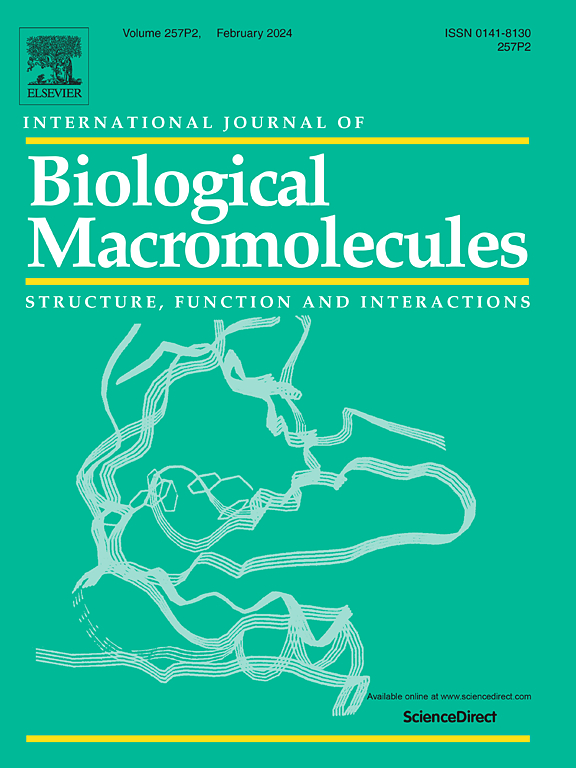Starch nanoparticle loading cinnamon essential oil encapsulated by complex coacervation of chitosan and gum Arabic improve the stability and antibacterial potential of the microcapsules
IF 7.7
1区 化学
Q1 BIOCHEMISTRY & MOLECULAR BIOLOGY
International Journal of Biological Macromolecules
Pub Date : 2025-05-01
DOI:10.1016/j.ijbiomac.2025.143613
引用次数: 0
Abstract
Essential oils have excellent antibacterial effects, but the rapid volatility of essential oils reduces their antibacterial effects. Therefore, the adsorption and slow release behavior of essential oils are of great significance for food preservation. This study used starch nanoparticles (SN) with different average particle sizes as carriers to adsorb cinnamon essential oil (CEO) and obtain starch nanoparticle - cinnamon essential oil (CEO-SN) complexes. Chitosan (CS) and Arabic gum (GA) composite films were used as wall materials, and sodium tripolyphosphate (STPP) was used as a curing crosslinking agent to encapsulate CEO-SN, forming CEO microcapsules (CM-CEO-SN). The optimal conditions of preparing CM-CEO-SN were determined by a single-factor experiment and response surface methodology. The thermal stability, morphology, in vitro release and antibacterial potential of the microcapsules were examined using Fourier transform infrared spectroscopy, scanning electron microscopy, thermogravimetric differential thermal analysis and differential scanning calorimetry. The results showed that the release rate of CM-CEO-SN300 decreased by 33.7 % and had the better slow release effect and thermal stability. In addition, CM-CEO-SN300 effectively inhibited the spoilage of cherry tomatoes during storage. These findings provide useful guidance for extending food shelf life.
壳聚糖与阿拉伯胶复合凝聚包封肉桂精油后,淀粉纳米粒负载肉桂精油,提高了微胶囊的稳定性和抗菌潜力
精油具有优良的抗菌作用,但精油的快速挥发性降低了其抗菌作用。因此,研究精油的吸附和缓释行为对食品保鲜具有重要意义。本研究以不同平均粒径的淀粉纳米颗粒(SN)为载体吸附肉桂精油(CEO),得到淀粉纳米颗粒-肉桂精油(CEO-SN)配合物。以壳聚糖(CS)和阿拉伯胶(GA)复合膜为壁材,以三聚磷酸钠(STPP)为固化交联剂包封CEO- sn,形成CEO微胶囊(CM-CEO-SN)。通过单因素实验和响应面法确定了CM-CEO-SN的最佳制备条件。采用傅里叶变换红外光谱、扫描电镜、热重差热分析和差示扫描量热法考察微胶囊的热稳定性、形貌、体外释放度和抗菌潜力。结果表明,CM-CEO-SN300的释放率降低了33.7%,具有较好的缓释效果和热稳定性。此外,CM-CEO-SN300还能有效抑制圣果贮藏过程中的腐败变质。这些发现为延长食品保质期提供了有益的指导。
本文章由计算机程序翻译,如有差异,请以英文原文为准。
求助全文
约1分钟内获得全文
求助全文
来源期刊
CiteScore
13.70
自引率
9.80%
发文量
2728
审稿时长
64 days
期刊介绍:
The International Journal of Biological Macromolecules is a well-established international journal dedicated to research on the chemical and biological aspects of natural macromolecules. Focusing on proteins, macromolecular carbohydrates, glycoproteins, proteoglycans, lignins, biological poly-acids, and nucleic acids, the journal presents the latest findings in molecular structure, properties, biological activities, interactions, modifications, and functional properties. Papers must offer new and novel insights, encompassing related model systems, structural conformational studies, theoretical developments, and analytical techniques. Each paper is required to primarily focus on at least one named biological macromolecule, reflected in the title, abstract, and text.

 求助内容:
求助内容: 应助结果提醒方式:
应助结果提醒方式:


